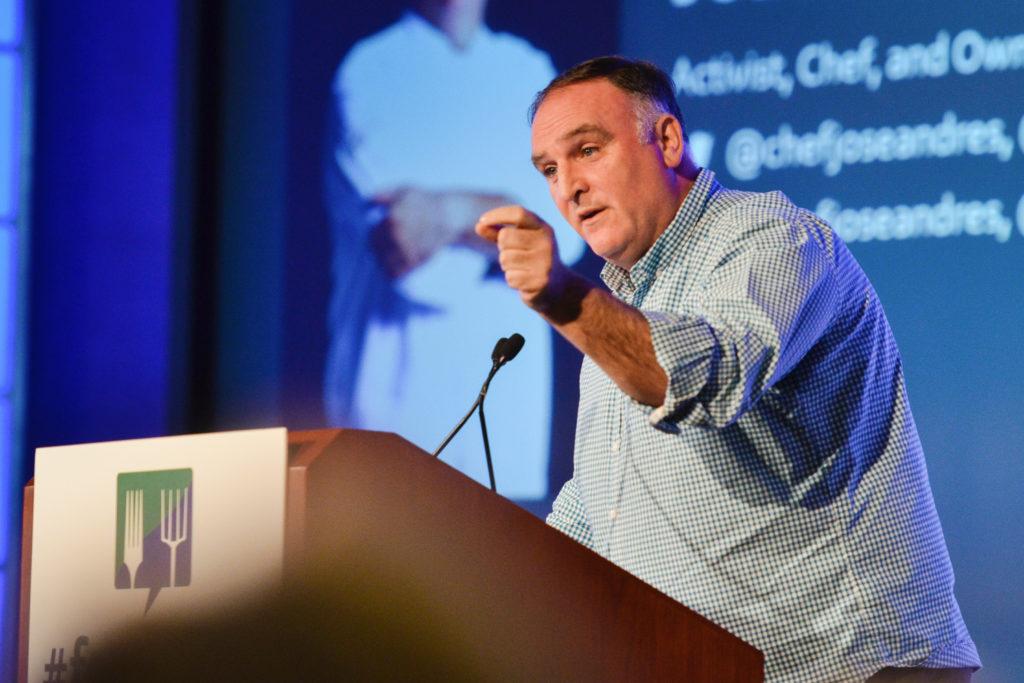Celebrity chef and philanthropist José Andrés said he drew from his experience as a chef and humanitarian to revamp his course covering food and sustainability.
Andrés, GW’s 2014 Commencement speaker, said he’s been updating the course intermittently since the class was offered for the first time in 2013. Students who took the class last semester said Andrés was present for most of the sessions, and the course’s speakers, like Michael Lastoria, the CEO of &Pizza and Dolores Huerta, who co-founded the National Farmworkers Association, inspired them to be more conscious about the source of their food.
Andrés said he hopes students will make more ethical and sustainable food choices after taking the course, called “World on a Plate,” to counteract the effects of the “climate crisis,” like worsening wildfires and stronger, more frequent hurricanes.
“We all are eating every day, two, three, six, 10 times a day, so if we are all thinking a little bit more about all the things that are touching our food, we can maybe be a little more thoughtful about the entire food system,” he said in an email.
Andrés added that the course is “constantly” evolving and he “cannot wait” for the next time GW offers the course in the fall semester.
“This affects us all, and each of us must educate ourselves about the future, about how we can go in a better direction,” he said. “These students are smart to be studying it now when they are young, and they can go out into the world and make it better for future generations.”
Andrés is the founder of World Central Kitchen, an organization that combats worldwide hunger and poverty. He led humanitarian relief efforts in countries like Puerto Rico and Australia in the wake of natural disasters in 2017 and 2019, respectively.
Max Gelber, Sustainable GW’s program manager of academics and research, said he and other sustainability officials spoke with experts in the field to determine what to include in the class curriculum. He said inviting world-renowned speakers, like Huerta and Lastoria, and discussing the intersection between food and sustainability broadened students’ understanding of how issues like food insecurity reflect larger environmental trends, like natural disasters and food waste.
“There are a lot of faculty working on a diverse range of topics that are either directly food related or inextricably connected to food,” he said. “As you know, it’s kind of a hot topic – food deserts, food insecurity.”
Gelber said he and Tara Scully, the director of the sustainability minor degree program, will incorporate student feedback about how to improve the course the next time the University offers the class. He said future changes could include solidifying the readings on the course syllabus that corresponded with each guest speaker, which he said was subject to change because of guest speakers’ unpredictable schedules.
“I would say that the structure of the course we need to work on strengthening – that’s definitely something we’re going to do moving forward,” Gelber said.
Scully, who is also an assistant teaching professor of biology, said she received “great feedback” from conversations she and Gelber held with students who took the course and graduate teaching assistants.
“We’re going to go through and try to figure out how to streamline the instructions, but we’re going to keep all of the projects,” she said. “We’re just tweaking the wording and how they’re paced throughout the semester.”
She said providing students with opportunities to meet up to three speakers a week and participate in class projects in lieu of holding exams made the course more “experiential.” But Scully said she hopes to offer fewer guest speakers moving forward so students have more time to ask questions and converse with the speakers and give each speaker more time to present.
“They were passionate about topics they were passionate about the speakers, and that’s what motivated them to learn,” she said.
Students who took the course said Andrés’ teaching increased their awareness of how food-related issues like food insecurity both result from and exacerbate global issues like climate change.
Senior Jan Nowak, an international affairs major and the Student Association’s vice president for sustainability, said the class helped him learn about complex processes, like farming and economics, that affect how food is made.
“Food is a really deceptively complex and interconnected issue,” Nowak said. “Food is something that everyone eats, obviously, and is really tied into every single person in not only what they eat and where that food comes from, but also the culture behind that food.”
Political communication major and junior Paige Grande said she worked at several restaurants during high school but wanted to learn more about how food is produced. She said the class encouraged her to buy food from sustainable sources and taught her how to find quality food products.
“I was left with a lot of these like big questions to ponder about: how do we actually do this?” Grande said. “How do we have things like living wages for workers and having a sustainable agriculture products while also being affordable and making sure that this food is available to everybody and not just super wealthy people?”
Grande said she enjoyed hearing a lecture from Lastoria, the CEO of &Pizza, who spoke about his goal to prioritize the experience of &Pizza workers and pay them a living wage.
“Thinking about what are ways that we can both create like sustainable food systems that are equitable, that are focused on actually like empowering farmers and treating people,” Grande said.




